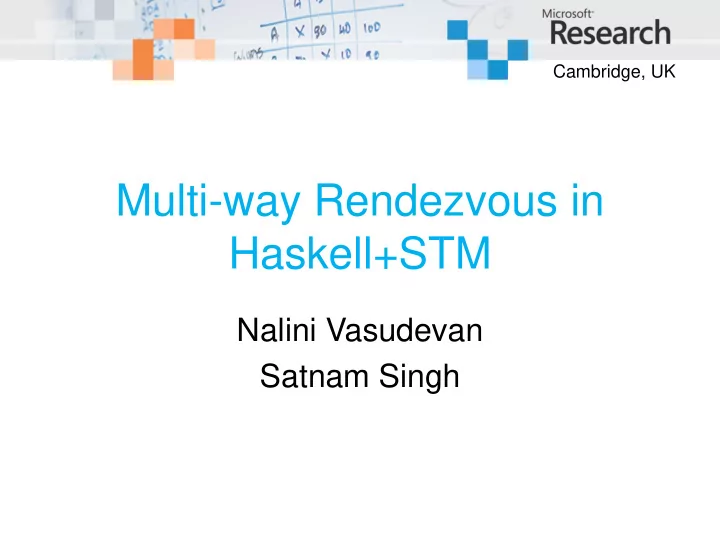

Cambridge, UK Multi-way Rendezvous in Haskell+STM Nalini Vasudevan Satnam Singh
Objectives • Goal: trying to encode various kinds of concurrency idioms in STM Haskell. • Deterministic parallelism. • Par/seq? • Multi-way rendezvous (SHIM). • Can this be implemented adequately as a library in Haskell with MVars and STM? • Is it sensible to try and encode concurrency idioms with STM?
Comega Join Patterns using System ; public class MainProgram { public class Buffer { public public async async Put Put (int value) ; public public int int Get () & Pu Put(int int value) value) { return value ; } } static void Main() { buf = new Buffer () ; buf.Put (42) ; buf.Put (66) ; Console.WriteLine (buf.Get() + " " + buf.Get()) ; } }
One Shot Synchronous Join (&) :: TChan a -> TChan b -> STM (a, b) (&) chan1 chan2 = do a <- readTChan chan1 b <- readTChan chan2 return (a, b) (>>>) :: STM a -> (a -> IO b) -> IO b (>>>) joinPattern handler = do results <- atomically joinPattern handler results example chan1 chan2 = chan1 & chan2 >>> >>> \ (a, b) -> putStrLn (show (a, b))
Biased Choice (|+|) :: (STM a, a -> IO c) -> (STM b, b -> IO c) -> IO c (|+|) (joina, action1) (joinb, action2) = do do io <- atomically (do do a <- joina return (action1 a) `orElse` do do b <- joinb return (action2 b)) io (chan1 & chan2 & chan3, \ ((a,b),c) -> putStrLn (show (a,b,c))) |+| (chan1 & chan2, \ (a,b) -> putStrLn (show (a,b)))
Conditional Joins (??) :: TChan a -> (a -> Bool) -> STM a (??) chan predicate = do do value <- readTChan chan if if predicate value then en return value else se retry (chan1 ?? ?? \x -> x > 3) & chan2 >>> \ (a, b) -> putStrLn (show (a, b))
SHIM void f(int a, int &b) { while (true) { b = a + 1; next b; // sends b since b is passed by reference next a; // receives a since a is passed by value } } void g(int b, int &c) { while (true) { next b; // receives c = b; next c; // sends } } void main() { int a; a = 0; int b; int c; f(a, b); par g(b, c); par g(c, a); }
SHIM void fifo(int i, int &o, int n) { int c; int m; m = n- 1; if (m) { g(i, c); par fifo(c, o, m); } else { g(i, o); } }
Multi-Way Rendezvous
DVar data DVar a = DVar { dval :: TVar (Maybe a), -- This is the value of the DVar variable (if it has one) dname :: String, -- This is the name of the DVar writerRegistered :: TVar Bool, -- Writer registered? numReaders :: TVar Int, -- The number of registered readers numReadsSoFar :: TVar Int, -- The number of reads that have occurred allReadsDone :: TVar Bool -- True if all the reads on a dVar have been performed }
writeDVar writeDVar :: DVar a -> a -> IO () writeDVar dVar value = do do -- First perform the write atomically $ writeTVar (dval dVar) (Just value) writeTVar (allReadsDone dVar) False -- Now wait for all reads to occcur atomically $ do do allDone <- readTVar (allReadsDone dVar) if if not allDone then then retry else else return ()
waitOnValue waitOnValue :: TVar (Maybe a) -> STM a waitOnValue maybeT = do do jv <- readTVar maybeT let let Just v = jv if if isNothing jv then then retry else else return v
readDVar readDVar :: DVar a -> IO a readDVar dVar = do do v <- atomically $ do do v <- waitOnValue (dval dVar) -- Indicate that we have read it nrRead <- readTVar (numReadsSoFar dVar) writeTVar (numReadsSoFar dVar) (nrRead+1) -- See if all the reads have occured nrReaders <- readTVar (numReaders dVar) when (nrRead+1 == nrReaders) -- Release waiting writer $ writeTVar (allReadsDone dVar) True return v atomically $ do do -- Wait until all reads have occured allDone <- readTVar (allReadsDone dVar) when (not allDone) retry nrRead <- readTVar (numReadsSoFar dVar) writeTVar (numReadsSoFar dVar) (nrRead-1) when (nrRead == 1) $ writeTVar (dval dVar) Nothing return v
dPar dPar :: IO a -> IO b -> IO (a, b) dPar function1 function2 = do do done1 <- newEmptyMVar done2 <- newEmptyMVar forkIO (do res <- function1 putMVar done1 res ) forkIO (do res <- function2 putMVar done2 res ) res1 <- takeMVar done1 res2 <- takeMVar done2 return (res1, res2)
registerWriter registerWriter :: DVar a -> IO () registerWriter dVar = -- Has someone already registered write interest atomically $ do do anyWriters <- readTVar (writerRegistered dVar) if if anyWriters then then error "Too many writers." else else -- Record that fact that this dVar now has a writer writeTVar (writerRegistered dVar) True •
TwoReaders • (Emacs)
Dynamically created dPars
Question • In SHIM the compiler can tell by analysis how many reading and writing threads are acting on a DVar. • If we want to embed a DPar like mechanism in Haskell is it possibly to statically check for programs with too many writers?
Recommend
More recommend